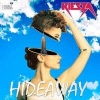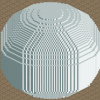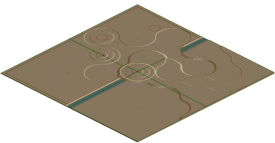RCT Discussion / Spotlight Thoughts
-
 22-July 20
22-July 20
-

 inthemanual
Offline
Another day, another ~contest~ argument about spotlights.
inthemanual
Offline
Another day, another ~contest~ argument about spotlights.
The Spotlight accolade represents an ideal–parks that we decide to specifically showcase to represent ourselves. What does that mean though? What line gets drawn to determine what qualifies as a spotlight and what's left on the chopping block? Beyond the obvious objective requirements (80%+ and 75% "yes" votes) there really isn't one. The determining factor is really what we as a community, a panel, or a Steve decide will be worthy of a "yes" vote.Many factors go into parkbuilding and the thought and care put into each understandably grows as builders approach Spotlight-level building quality. Which of those play into earning a "yes"? The answer varies by the voter, and sometimes even by the park.1.) Technical QualityIf we had it Steve's way, I believe this would be the only indicator of a park's Spotlight status or not. This tenet asks if a park is technically sound, well-detailed, elegantly-composed, and just plain GOOD enough to earn the coveted badge. In many recent votes, however, it's been shown that the panel does not find this marker to be the only indicator of what belongs in our site's top showcase. Not only have many highly detailed, technically skilled, and beautifully accurate parks missed the mark, but several parks showing less technical skill but excelling in other tenets of Spotlight-worthiness have passed the bar.2.) NoveltyThis tenet asks whether a park does something new. This doesn't mean that a Spotlight has to be it's own brand new style of park, but that a Spotlight does a few things that we haven't seen before as a community. Sometimes, this can be new hacks. Sometimes, a whole new set of custom scenery. Sometimes, you'll see it as a new brand of parkmaking—sufficient changes in density, accuracy, life, attention-to-detail, or focus on different parts of a park that can make viewers experience something new. Whatever it is, Spotlight-winning parks tend to have something that makes them unique.3.) ContentDoes size matter? Typically, the panel tends to say yes. Smaller parks tend to miss the mark on Spotlight even when they set genre-defining expectations and showcase an unforeseen level of technically brilliance. Lenox Mall and DAW run along these lines, as does the recent near-miss by Glacier Cove. Small-but-brilliant parks can gather a few "yes" votes, but typically not enough to earn the accolade. In fact, there are currently no Spotlights smaller than 118x118.4.) EffortThis tenet wraps up all the others, but is it's own ideal as well: Spotlight parks need to have significant effort invested into them. Our community wants to show off hard work, disciplined building, and cool, thoughtful stuff. Many voters won't determine that a park you whipped up over a weekend would be worthy of a Spotlight, no matter how beautiful it may be, because they know it could be better if you'd spent more time improving it. Voters who hold this tenet in high regard want to see people work hard for their Spotlights, advertise their parks thoughtfully, work with others over time to make improvements, and spend time and energy making the work your own personal best.Not every tenet described above will matter to every voter. Nor should any voter feel compelled to consider all of them. But they do each matter to the panel as a whole, and any park striving for Spotlight should aim to capture all of them. -

 inthemanual
Offline
inthemanual
Offline
As far as other forms of voting go, I believe much of the community weighs the tenets differently.
In contests, we tend to prioritize Novelty and Technical Quality, which can result in really close match-ups like EVIL vs CnC, where each excelled at a different tenet.
In community voting/accolade percent score, I think Technical Quality reigns supreme, with some voters secondarily considering Content and Novelty. -

 nin
Offline
nin
Offline
I absolutely hate when it feels like people voted yes purely because of "effort" they perceived the builder put in to create their park. Oftentimes this results in a "they deserve it" remark which totally invalidates anything others have made in half the time someone else may have done it in, purely because of the clout said builder may have within the community. This has been a case in both recent and historic Spotlight winners.
With this mindset, "effort" = "time spent" which is both biased and incorrect thinking. If two builders built a high caliber park, one taking 5 years to do so and the other half that, the person taking half the time has obviously put more effort into the project because they were able to finish it more efficiently. Personally, I don't care if the other has spent decades on a project or is even a kind, involved member of the community and thus "deserves" some sort of reward for that, as panelists and viewers should be looking at a park strictly for what it is within the confines of that viewing. Any preconceived thoughts regarding the project or builder(s) involved should have no influence on the final decision a viewer has towards a park.
The above mindset should also be applied for parks branded with a specific parkmaking style or branding, ie. realistic/fantasy, or Six Flags, Disney, etc. While specific details catered to those styles or IPs may suit better for specific builders, there should be no influence on the final voting decision other than perhaps a "did this park achieve what it set out to do". If a panelist/viewer does not like a specific style, ie. "Dirty American realism", they should be able to withhold their bias and view a park and rate it fairly in comparison to something that may suit their preferences more. Even the most basic of comic book, popcorn movies can win over critics the same way more auteur-driven films can.
In terms of content, it is absolutely fair imo to allow the amount of a park's content to drive the final decision regarding a Spotlight or not. If I build the greatest 15x15 plot of land ever seen in this game, the actual amount of content to be viewed within those squares is incredibly limited compared to something ten times that size, at least in the traditional sense of building. I personally expect a "good" park to hold my interest longer than that of a poor one, but that's also assuming that a park of larger size holds more. If a builder was able to hold my interest for hours with a small plot of land, then perhaps that park too could theoretically cross that threshold. In a recent case, Glacier Cove held my interest far longer than other Spotlight winners due to the amount of content it was able to pack in.
In regards to novelty, I personally believe it will be the downfall of contests like H2H bc parks no longer require cohesion as much as they used to, and instead tiny micro detailed tricks and hacks make people excited and forgetful of other moments of parkmaking. I personally don't care for what sets of scenery you've introduced into your park so long as the result speaks for itself, in the same way I don't care what sort of camera a filmmaker uses to produce his picture. Again, let the park speak for itself rather than sugar-coating it with neat tricks or objects you've covered up the cracks with.
Lastly, with technical quality, like some have stated a good, well-made park does not mean an instant winner. I believe Paradise Island was one of the first controversial parks in that regard, where it technically was Spotlight-quality work without introducing anything else into the mix. To relate it back to filmmaking, the same sorts of movies get stale after repeated sequels and spinoffs, so why should I keep watching? What can you bring to each park to given it its own unique identity and lasting value. Referring to recent releases, SFWoD definitely hits that mark because while it may have been built to a high standard, it didn't resonate with many in a lasting way because we as a community have seen that sort of park evolve into what it is over the last decade. It's not a case of "realism is dead", but rather a lack of innovation to the medium despite it quality, which is exactly what I see Golds as. -

 inthemanual
Offline
inthemanual
Offline
In regards to novelty, I personally believe it will be the downfall of contests like H2H bc parks no longer require cohesion as much as they used to, and instead tiny micro detailed tricks and hacks make people excited and forgetful of other moments of parkmaking. I personally don't care for what sets of scenery you've introduced into your park so long as the result speaks for itself, in the same way I don't care what sort of camera a filmmaker uses to produce his picture. Again, let the park speak for itself rather than sugar-coating it with neat tricks or objects you've covered up the cracks with.
Lastly, with technical quality, like some have stated a good, well-made park does not mean an instant winner. I believe Paradise Island was one of the first controversial parks in that regard, where it technically was Spotlight-quality work without introducing anything else into the mix. To relate it back to filmmaking, the same sorts of movies get stale after repeated sequels and spinoffs, so why should I keep watching? What can you bring to each park to given it its own unique identity and lasting value. Referring to recent releases, SFWoD definitely hits that mark because while it may have been built to a high standard, it didn't resonate with many in a lasting way because we as a community have seen that sort of park evolve into what it is over the last decade. It's not a case of "realism is dead", but rather a lack of innovation to the medium despite it quality, which is exactly what I see Golds as.
Perhaps I didn't explain my thoughts on Novelty too well. I don't see it as just gimmicks and tricks, but some important factor to make your park unique. Sometimes that's done with new objects that change the game (a la Kumba), new or clever uses of hacks (Feira), but other times it's just setting a new standard, a new identity or style of parkmaking that inspires others, like Starpointe.I absolutely hate when it feels like people voted yes purely because of "effort" they perceived the builder put in to create their park. Oftentimes this results in a "they deserve it" remark which totally invalidates anything others have made in half the time someone else may have done it in, purely because of the clout said builder may have within the community. This has been a case in both recent and historic Spotlight winners.
With this mindset, "effort" = "time spent" which is both biased and incorrect thinking. If two builders built a high caliber park, one taking 5 years to do so and the other half that, the person taking half the time has obviously put more effort into the project because they were able to finish it more efficiently. Personally, I don't care if the other has spent decades on a project or is even a kind, involved member of the community and thus "deserves" some sort of reward for that, as panelists and viewers should be looking at a park strictly for what it is within the confines of that viewing. Any preconceived thoughts regarding the project or builder(s) involved should have no influence on the final decision a viewer has towards a park.
I don't think it's really fair to put out hate for the way people vote. For the community as a whole, the only thing we have to define what a Spotlight actually means are the objective requirements, the accolade description, and our own personal interpretations about what allowed the parks that have earned it before to earn it. I believe that results in people tending to vote yes when they see some combination of the above tenets performed exceptionally. For some, an exceptional amount of effort (combined with a park technically strong enough to score 80%+) is enough to make it worthy of a yes. I'm not one of those people, I don't necessarily agree with those people, but I don't think it's fair to hate them for feeling that way, especially when there's not any objective guidance to suggest that they're wrong. -

 Dr_Dude
Offline
Dr_Dude
Offline
the reason more than one person votes is everyone is going to vote differently, forever, and these conversations won't be interesting until the community is more invested in analysis and criticism as a medium
-

 nin
Offline
nin
Offline
Your response to novelty is how I approach it as well @ITM. Watkins Woods changed realism, Starpointe helped revolutionize it, Toon introduced his blocks and supports via contests and designs, Kumba the same. I mean moreso the way that Head 2 Head parks and recent trends tend to be geared towards animated objects, frozen staff, and the like. Stuff like that doesn't jade me personally, and I fear that it can have too much influence on someone's perception of a park (so long as the rest of the map doesn't support it). Glacier Cove would be an example where minute details and cohesive parkmaking blend well, imo.
Admittedly many of my thoughts may seem authoritative but they are simply how I base my own votes and thoughts. It's all subjective, anyway. As a whole, the most important aspect of any medium is composition, so the overall arrangement and harmony of things I see on screen is going to reign supreme more than anything else. Everything branches from this, from "can I imagine myself there" to ride design, architecture, whatever. A well composed park or area tells me more about how well a parkmaker can make something more so than anything else. -

 Ge-Ride
Offline
Ge-Ride
Offline
I have a different criteria that's similar to novelty but rather different. I don't expect all parks to be completely different from each other, necessarily, even if I try to be different myself. What I expect is that each park is done with specificity, that you made the park so that it works well for what it is and that it naturally is different from other parks simply as a result of doing its own thing. Innovation is important too to keep things fresh because it keeps the viewing experience from going stale to have distinctly different ideas.
While specificity is important, I look for a more subjective quality of 'intrigue' to decide how much I like something. Do the roller coasters interest me? Do the park's details interest me or do I gloss over it because I've seen something similar already or because it lacks the aesthetic quality necessary to keep me looking?
I agree with technical quality as a requirement as well. There is a difference between a fun but less seriously crafted park and a well crafted work that is truly extraordinary. Though, to be quite frank, I regularly like some of the lower rated parks better than many spotlights because they have an aesthetic character that doesn't get approved by as large of a group of people regardless of technical quality.
I think that a lot of more inventive fantasy works have gotten lower ratings, like the Bohemian Rhapsody synced coaster(Or my own Geon but I could have sculpted the planet much better, and put in some sort of space station orbiting the planet to provide more to look at so that one's on me). I really like BIgShooterGill's Mario Kart: All Cup Tour but it's based on an existing property. I can't be sure be of the entire cause, as I don't know exactly how many good fantasy parks were submitted. Regardless of the past, I hope to see more fantasy spotlights in the future.
That's about all I can think of to say at the moment.
(Had wrong parkmaker for Mario Kart listed)
-

 AvanineCommuter
Offline
Novelty isn’t always required though; Veteris getting spotlight is proof enough that a beautiful well composed park with classic NE style work is enough to win.
AvanineCommuter
Offline
Novelty isn’t always required though; Veteris getting spotlight is proof enough that a beautiful well composed park with classic NE style work is enough to win. -

 Cocoa
Offline
Cocoa
Offline
this is outrageous. where are the accolade panelists who come in to take spotlights away? where are they? this kind of behavior is never tolerated at New Element. You shout like that they put you in gold. Right away. No trial, no nothing. Realists, we have a special gold for realists. You are unfinished: right to gold. You are playing custom music too loud: right to gold, right away. Rides too fast: gold. Slow: gold. You are charging too high prices for umbrellas, maps: you right to gold. You undertheme park? Believe it or not, gold. You overtheme park, also gold. Undertheme, overtheme. You make an agreement to duo with a parkmaker and you don't show up, believe it or not, also gold. We have the best parkmakers in the world because of gold.
-

 Timothy Cross
Offline
Timothy Cross
Offline
I suppose that rather than a single score per that single park, a score per element (rides, theming, etc.) going in to some grand total is an idea. And overall composure (use of space, scale, etc.) plus use of “RCT theory” (rules like music has its rules in music theory), if you will, factoring in some how.
“I Know” is a member (me) on discord who purposed “mathematic isometric theory”, or whatever you could call it, that would act as a ‘theory’ with use of space and scale in the isometrics of RCT to where overall composure harmonizes sort of mathematically to form the whole, whatever theme is used. That is probably a bad explanation, and I haven’t played with it anymore since posting there, not sure if I ever will, but point being is an overall more technical set of rules and varying categories going into the vote could make things less opinionated and more absolute?
-

 Ge-Ride
Offline
Ge-Ride
Offline
You've put up some interesting ideas, TC.
A positive of "mathematic isometric theory" is that it would be more objective than going strictly by gut feeling and could put the 80+ scoring spotlight into the past. It would also help give beginning players more structure in how they should build their parks.
The Negatives:
A perfect park with really bright eye irritating colors wins spotlight despite nobody wanting it to because it plays by the rules but nobody likes it despite its good qualities, sort of like an extreme version of the reception of the film The Crucible.
Does it matter if the "MIT" is tried and true or has much new to it, like the use of monorails to break the strict isometry or the use of diagonal paths, or whatever idea comes across next?
It still doesn't address some of the issues people have with realistic parks: roller coasters with too familiar layouts, how to score it based on its resemblance to real parks, or how good the custom music goes with the park.
I don't know if having RCT theory would work simply based on your comparison to music theory. The problem is that music theory doesn't have a single set of rules. There's very different theory between classical music, jazz, and other genres like rock, funk, and hip hop. Not that I'm an expert.
But for a simple example of a song that breaks a rule is California Girls. It has a chord progression that doesn't resolve and at the end of the song.
Maybe your idea is different than I imagined and if so, you can describe it in a bit more detail if you'd like.
-

 inthemanual
Offline
A strict set of criteria would likely cement the meta and limit the growth of new ideas.
inthemanual
Offline
A strict set of criteria would likely cement the meta and limit the growth of new ideas. -

 Ge-Ride
Offline
Ge-Ride
Offline
You have a good point, ITM. We would have to factor in new ideas somehow. If it were more of a sort of aesthetic map and less of a strict set of rules then it would be better, but of course that means that there would have to be some way of interpreting it so maybe it wouldn't improve things directly as much as provide a good argument for debating a work's merit.
-

 Timothy Cross
Offline
Some of my thoughts I’ll try to expound on, though half-baked at the moment, might be much like in music, where both rules and innovation apply.
Timothy Cross
Offline
Some of my thoughts I’ll try to expound on, though half-baked at the moment, might be much like in music, where both rules and innovation apply.
Regarding such theories I touched on, It might be something that has to develop, evolve and change over time. Classical music, early in time, leaned more towards rational thought towards composition, until the romantic era, which leaned more towards emotional expression, if my music history is correct.
To start with, it seems to me there’s already some starting rules for colors, paths, fences, theming, grain size, etc. which are elements I’ve noticed in Liampie’s ‘rules’ thread which could be implemented into “MIT”.
“MIT” would play with both strait angles and curvature, and along with the position of things as a positive space, space in-between things as either nothing or trees or paths or what have you as negative space, plus scale and the isometric view factoring in (how many tiles does the width and height of a given thing take up), is a big part of what it would be.
I quickly sketched a note for a single possible rule I could give myself a long time ago, forgive the sloppy wording:
“Things are as condensed as possible, while using both positive and negative space, but with no extra space within mathematical use of tiles. For example, I may want an isolated tree (positive space) in a large area of grass (negative space) that has a contrast between a smaller positive space and larger negative space, so if the tree is 8 units high (2 tiles covered in the isometric view), I would probably want twice as much negative space, which would be 4 more tiles out, so the tree rests surrounded by 6 tiles out and away…”
And there could imply a direction of a composition: the artist’s own set rules and those rules carried out throughout the map to achieve a certain aesthetic. For example, I may desire to create an RCTNW-inspired hotel on a coast, so perhaps my rules are for the hotel as a focal point in the center of the map with a parking lot in the front of the hotel and the coast + ocean behind, hugging the shape of the hotel, with the use of attempted-perfect curvature of the hotel and land. Thus (for a bad example) “MIT” is used for curves of the coast following a pattern of 3 tiles, 2 tiles, 1 tile, 1 tile, 1 tile, 2 tiles, 3 tiles (this in theory creates the quarter of a complete circle:(5,2,1,1,1,2,5,2,1,1,1,2,5,2,1,1,1,2,5,2,1,1,2), but my coast could only show a half circle) and then my hotel shape hugs the coast as seen in the isometric view. (in precise measurement and with desired amount of positive space (hotel) and negative space (coast and water)). The parking lot continues on this idea accordingly. Of course in this example, it would be a minuscule hotel, but I’m trying to make a point you probably get the gist of. Below is my toying with geometric precision to attempt perfect curvature with the prior mentioned circle rules but different in sizes:

Concerning innovation with coasters, realism, custom music, etc. I might be missing something, unless the isometric building system and view allows for these theories to work with any genre, still allows innovation within the rules (as music allows innovation within a few universal and unbreakable rules), and then park music is simply its own category, one to vote on how well it fits the given scene’s atmosphere.
I don’t think things can be entirely without opinion, but I do think rules, as said at the top of this post, can have a few cemented, then others can develop, evolve and change, throughout time, within different genres and as ‘eras’ come and go, just like music has it’s owns trends and top 40 radio plays the more popular money-makers, while the underground groups form the innovations to soon become common place in the mainstream.
So I suppose all this could factor in to spotlight voting as I first purposed via some system created with categories and overall composure via the rules we as a site gravitate towards, and some rules are just simply unbreakable. Perhaps even forum threads like Liampie’s rules thread could further define things. -

 Scoop
Offline
Scoop
Offline
umm what? where was that argument said in this thread?this is outrageous. where are the accolade panelists who come in to take spotlights away? where are they? this kind of behavior is never tolerated at New Element. You shout like that they put you in gold. Right away. No trial, no nothing. Realists, we have a special gold for realists. You are unfinished: right to gold. You are playing custom music too loud: right to gold, right away. Rides too fast: gold. Slow: gold. You are charging too high prices for umbrellas, maps: you right to gold. You undertheme park? Believe it or not, gold. You overtheme park, also gold. Undertheme, overtheme. You make an agreement to duo with a parkmaker and you don't show up, believe it or not, also gold. We have the best parkmakers in the world because of gold.
-

 Recurious
Offline
Recurious
Offline
So I suppose all this could factor in to spotlight voting as I first purposed via some system created with categories and overall composure via the rules we as a site gravitate towards, and some rules are just simply unbreakable. Perhaps even forum threads like Liampie’s rules thread could further define things.
I think the whole idea of unbreakable rules is something we should definitely avoid. Some of the greatest artists in history came to be by breaking with conventions and rules. In the end, I think imposing rules is the exact opposite of what we should do. I also think there is no set of rules which could possibly apply to any given park. The rules in itself would also subjective, meaning that you don't actually solve any of the problems with subjectivity, you just hide them behind a layer of obscure rules.
-

 Timothy Cross
Offline
^ I think I agree now. Side note, there’s unbreakable rules in music, such as after two exact repetitions of a part of a song, you must change something or it grows boring to the ear, but maybe there’s nothing like that in RCT and my obsession with equating it to music is a bit off. My idea with rules would have involved the theory or idea I had that everyone looks at me crazy for, but maybe that’s neither here nor there now. But I still wonder about voting in categories for separate aspects of the park making.
Timothy Cross
Offline
^ I think I agree now. Side note, there’s unbreakable rules in music, such as after two exact repetitions of a part of a song, you must change something or it grows boring to the ear, but maybe there’s nothing like that in RCT and my obsession with equating it to music is a bit off. My idea with rules would have involved the theory or idea I had that everyone looks at me crazy for, but maybe that’s neither here nor there now. But I still wonder about voting in categories for separate aspects of the park making.
 Tags
Tags
- No Tags

